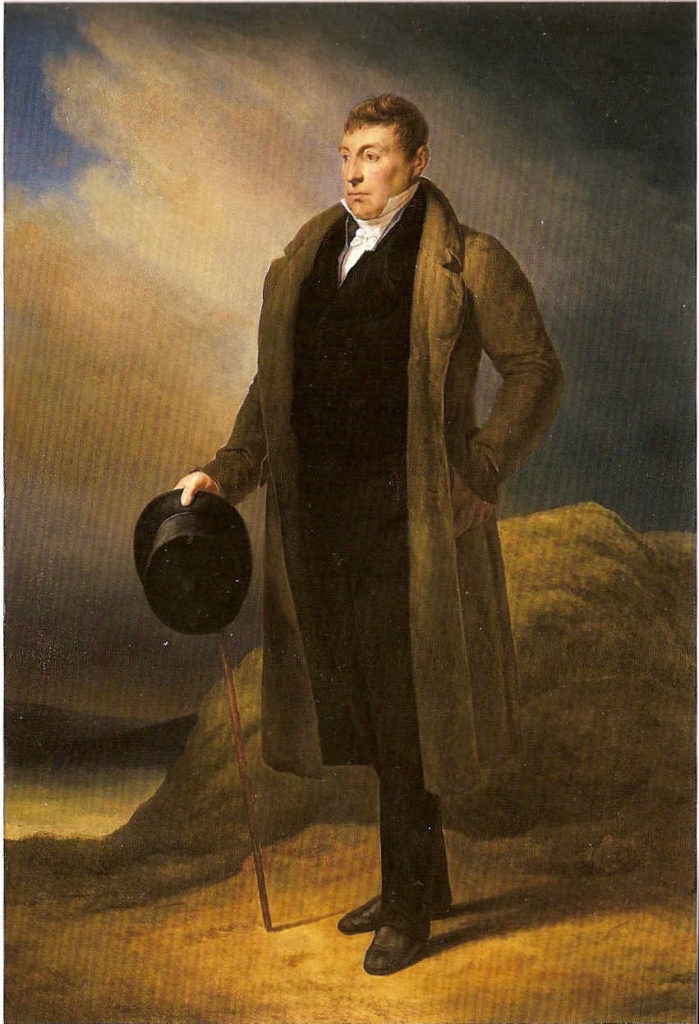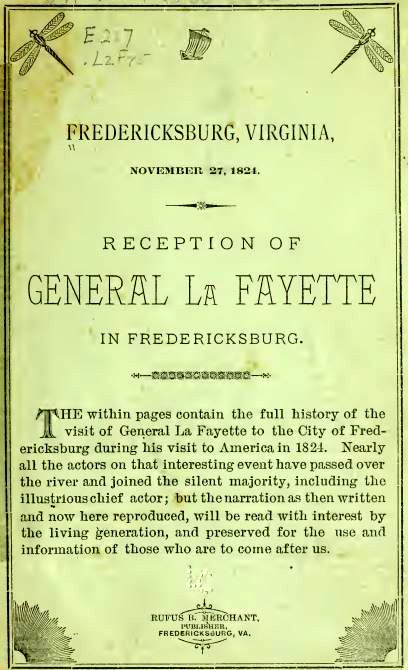
Lafayette’s trip would span all 24 states along a 6,000 mile route from July, 1824 to September, 1825. He encountered adoring crowds wherever he went. His fellow Masons put on a banquet virtually everywhere he went along with the Society of the Cincinnarians. The way was not always easy especially on the roads he followed in the rural south, often traveling at night. Fredericksburg’s visit was Nov 27, 1824. He had already visited Richmond and an ailing Jefferson at Monticello. There the Richmond volunteer cavalry accompanied Lafayette up the mountain. On the top were hundreds of spectators, including James and Dolly Madison.
Lafayette was 67 years old, the same age as President Monroe. Many of the revolutionary generation had passed away in including Washington and Franklin. In many ways his trip was the beginning of America’s 50 year anniversary of the celebration of independence which would occur two years later. Lafayette represented a link back to that earlier time providing new inspiration. It was also time to look to the future to the possibilities of America. The completion of the Erie Canal which would link the Great Lakes to the Hudson America symbolized this promise. It was also wrapped up in America’s sense of mission standing for freedom shortly after the Greek revolution of 1820 and 6 years before the 1830 July Revolution in France which saw the overthrow of Charles X and the creation of a constitutional monarchy. However, the contentious election of 1824 provided a dose of reality as the House of Representatives had to choose the winner, selecting John Quincy Adams over Andrew Jackson.
Lafayette came to Fredericksburg from the west after leaving Montpelier and proceeding through Orange. Upon his arrival on Sat. Nov 27, 1824 at the Wilderness he was received by a corps of about forty officers. After a reception provided by veteran of the American Revolution, they left 3pm with Col Hugh Mercer (member of St. George’s), a representative of the city. They arrived at the parade ground after almost 2 hours and just at sunset. The military groups there included Capt Duff Green of Falmouth Rifles (also a member of St. George’s) and two or three hundred citizens. The procession came to Fredericksburg went down Hanover Street to Caroline and then to Town Hall, today besides St. George’s where he was addressed by the Mayor with the the La Fayette Cadets at the center.
The next day was Sunday. Although Lafayette was a catholic, he was a practicing deist in terms of religion. However, he typically attended church services on Sunday out of respect for a nation that still kept the Sabbath. He also restricted his travel on Sundays after earlier criticisms in a New York newspaper and in some cases dispensed with the usual military honors on that day.
 A book was written on this visit Reception of La Fayette in Fredericksburg published by Rufus B. Merchant. It may have been written years after the event, at least after Lafayette who died a decade later. “Nearly all the actors of that interesting event have passed over the river and joined the silent majority, including the illustrious chief actor.” Lafayette slept at the Farmers hotel on Saturday and attended a reception at the Mason Lodge early on Sunday and then came to St. George’s for worship. Here is a portion of his visit to St. George’s as recorded in this book:
A book was written on this visit Reception of La Fayette in Fredericksburg published by Rufus B. Merchant. It may have been written years after the event, at least after Lafayette who died a decade later. “Nearly all the actors of that interesting event have passed over the river and joined the silent majority, including the illustrious chief actor.” Lafayette slept at the Farmers hotel on Saturday and attended a reception at the Mason Lodge early on Sunday and then came to St. George’s for worship. Here is a portion of his visit to St. George’s as recorded in this book:
“A procession was then formed, consisting of the most numerous assemblage of the Masonic Brethren that had ever been witnessed in Fredericksburg. In their peculiar order, the Committee of Arrangements, the civil authorities of the town and the military officers, and the General and his suite, were conducted to the Episcopal Church, where an excellent’ discourse was delivered to an overflowing congregation, by the Rev. Ed. C. McGuire. The text was taken from 139th Psalm, 7, 8, 9, 10, 11 and 12 verses, and the subject, the omnipotence of God, involving reflections on his particular agency in the affairs of men. The following is an extract:
“It inspires us with precious hope for ourselves and for all mankind. It is full of promise that we shall grow and prosper in every principle and work of holiness, and that soon the world throughout its darkest and most afflicted regions shall realize at once the brightest visions of the philanthropist, and the longing expectations of the saint, when God who hears the groans of nature in this nether world, and hears in infinite compassion, will put forth His power in surrounding us with those scenes of accomplished bliss, foretold by prophets and by poets sung, in which universal peace and love shall reign, in which the sword shall be beat into the plough-share, and the spear into the priming-hook, in which the wolf and the lamb shall feed together, and none shall be found to hurt or to destroy in all God’s holy mountain.
“That this glorious day is already dawning upon the world, whoever notes the signs of this distinguished age, must surely see. In hindrance of that illustrious era the civil and spiritual degradation of many of the nations of Christendom has heretofore opposed the must unyielding obstacles. Slavery in mind or body is the deadly foe of human happiness and human honour.
” Tis liberty alone that gives the flow’r
Of fleeting life its lustre and perfume.
And we are weeds without it. All constraint,
Except what wisdom lays on evil men,
Is evil; hurts the faculties, impedes
Their progress in the road of science; blinds
The eye sight of discovery; and begets
In those that suffer it, a sordid mind;
“Bestial, a meagre intellect, unfit
To be the tenant of man’s noble form.
“But in relation to all the obstructions of human happiness, God hath said, “I will overturn, overturn, overturn, till he comes, whose right it is.” In doing this, God works by means. lie lays under contribution all the powers of nature, puts in requisition all the energies of man, when he would achieve his bright designs. And is not the history of our day strongly marked with the indications of His agency in unsettling the foundations of tyranny, in vindicating the equal rights of man, and furthering the cause of universal liberty and peace ? What else can mean this mighty moral excitement, so widely pervading the reviving nations? What means this growing activity and thoughtfulness of the human mind ? What this restless longing after some new and untried goods? Never surely was the human mind more in earnest than at the present moment.
“The political commotions, which from such prominent distinctions of our age, have sprung from some deep and powerful working of the human soul. Men seem to have caught glimpses, however indistinct, of the dignity, rights and great interests of their nature; and a thirst for prohibited blessings, and impatience of long-endured wrongs, have broken out wildly, like the fires of Etna, and shaken and convulsed the earth. See you not in these things, assembling and embattling his hosts for deeds of glorious war, in righteous judgment waged against his foe, that subduing them under his feet, he may urge on to their bright and glorious consummation, his sublime and merciful designs in favour of our afflicted race ? May God in mercy speed the auspicious end, in pity and forbearance wielding his ”rod of iron,” 3-et with resistless energy, constraining the benign and propitious reign of universal peace and love. In furtherance of his purposes of unquestionable love, may he raise up and long sustain the friends and avengers of oppressed and suffering humanity. May He especially regard with favour, and crown with blessings, the illustrious advocate and defender of man’s equal rights, at whose feet this happy and grateful land delights to lay its tribute of profoundest gratitude and love. May the evening of his days be crowned with the blessings of providence and grace, and his eternity with the joys of Heaven, through the merits and intercessions of Jesus Christ our Lord and Saviour.”
—
Amen.
[As an aside, it is interesting McGuire made this statement -“Slavery in mind or body is the deadly foe of human happiness and human honour”. Psalm 9 includes the statement “The LORD is a refuge for the oppressed, a stronghold in times of trouble.” He contrasts the hope of his day with slavery. He may have been considering the foes of liberty at in the American Revolution or in his day in the 1820’s (“The Holy Alliance” as an example). The slavery issue in the US was heating up with the disagreement over extending slavery to Missouri which results in the Missouri Compromise in 1820. The inability to handle the slavery issue was seen in Virginia. In Richmond and Fredericksburg both slaves and free Blacks were prohibited from attending the ceremonies. The final act in the inability to handle the “peculiar institution” would occur 6 years later in a debate in 1831-32 in Virginia prompted by a slave insurrection in August 1831 led by Nat Turner. A result of the debate is that Virginia’s slaves were not freed.]
After Lafayette left St. George’s he would spend dinner with Judges Brooke and Coalter. Judge Coatler is buried in our graveyard and was an owner of Chatham. The evening was spent with the family of Captain Robert Lewis, George Washington’s nephew. Lewis (1769-1829) was the 10th son of Fielding Lewis and Betty Washington Lewis. He was the closest connection to the Washington family that Lafayette had. We don’t know whether Rev. Edward McGuire met Washington since he had married Judith
Lewis, a granddaughter of Betty Washington Lewis, and daughter of Robert Lewis.
On Monday, his last day in Fredericksburg, the La Fayette cadets escorted Lafayette proceeded through the streets of Fredericksburg to Town Hall next to St. George’s to meet the adoring crowds. He went to Gray’s Tavern for dinner which had 120 guests. He would depart for Washington at 5pm by carriage.
In September, 1825, John Quincy Adams would conclude Lafayette’s visit to America with a farewell address. “You have been received with rapture by the survivors of your earliest companions of arms. You have been hailed as a long absent parent by their children…And a rising generations, the hope of future time.. have [uttered] acclamations of joy at beholding the face of him who they feel to be the common benefactor of all. You have heard the mingled voices of the past, the present and the future.”
